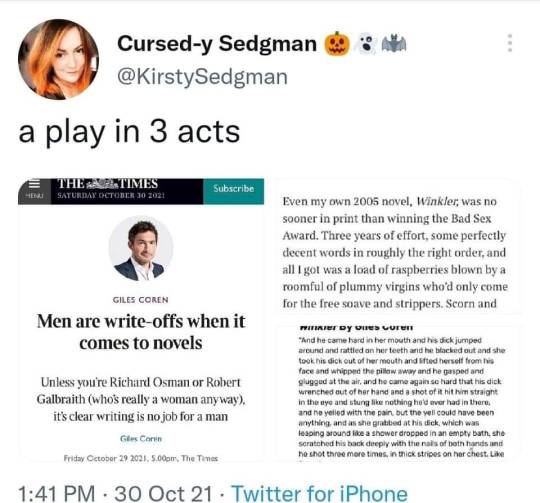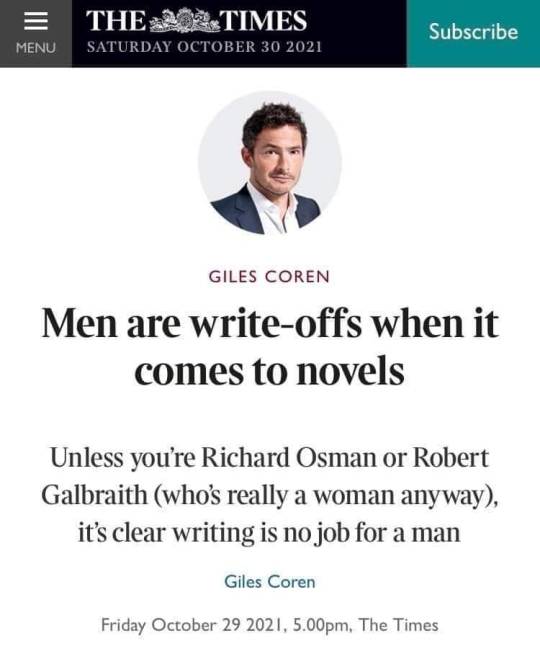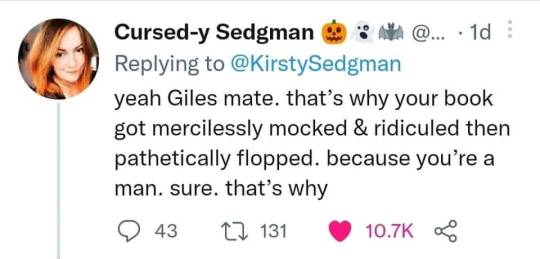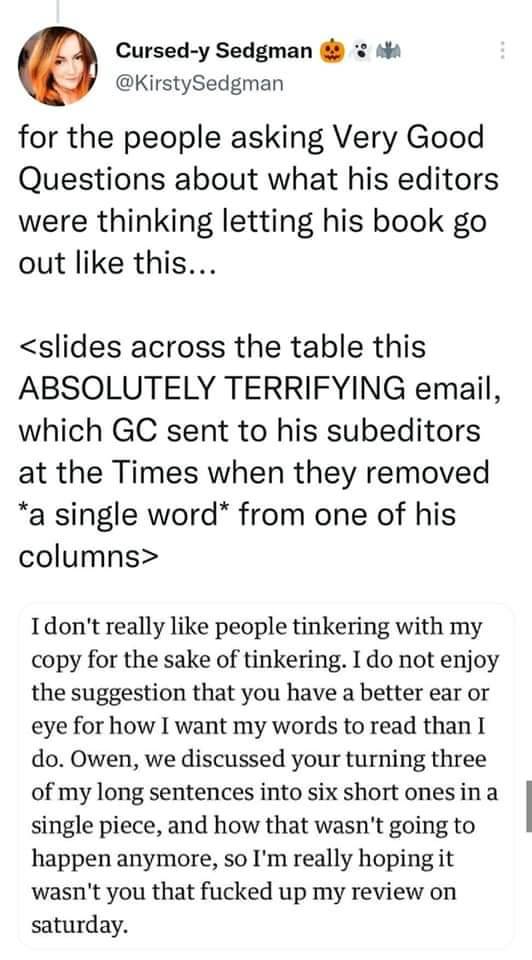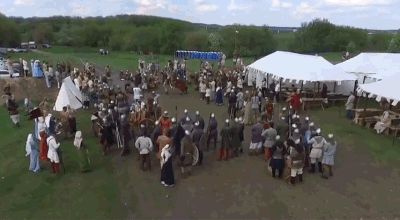Text
In the middle ages, clerics were actually the most likely to practice necromancy and it was their heavy use and dissemination of magical texts by these clerical men led to the rise in blaming women for witchcraft — leading to the mass, female-dominated "witch" burnings in the 1600s.
From Richard Kiekhefer's introduction to Forbidden Rites:
“To the extent that these early witch trials focused on female victims, they thus provide a particularly tragic case of women being blamed and punished for the misconduct of men: women who were not invoking demons could more easily be thought to do so at a time when certain men were in fact so doing.”
“The study of late medieval necromancy gives an exceptionally clear and forceful picture of the abuses likely to arise in a culture so keenly attentive to ritual display of sacerdotal power. Our own society, more fascinated with sexuality and its abuse, has its own concerns about miscreant priests and their abuse of young boys; the clerical misconduct most feared in the late Middle Ages was of a different order.”
During the middle ages, the church controlled through the lens of spiritual and magical power: women's use of herbs and medicines to control reproductive rights and bodily autonomy was marked as witchcraft. Queer folks' identities and lives were marked as demonic possessions & expressions of devilry. Ideas not in line with Church doctrine were marked as heresy and marks of moral corruption - to believe in heresy was to risk your eternal life. Books deemed too dangerous for "the masses" were burned.
Meanwhile, clerical men were summoning demons and using their role as spiritual leaders to coerce women into romance or marriage, to control their congregations, to defeat and punish their opponents and enemies.
Does it not sound familiar? Perhaps they did learn from the devil. After all, the devil speaks in inversion.
To quote my cohost over on @maniculum: "History doesn't repeat; it rhymes."
Never forget: every accusation is a confession.
56 notes
·
View notes
Text
@maniculum Oh HECK YEAH I was!
Of COURSE the dialogue rings false, because it's not reflective of many women's lived experience. Depicting women (especially in historical of historically-inspired fantasy settings) as either men-warriors-with-tits or feisty feminine-standard-embracing plucky-femme-fatales (to hyperbolize both sides) is just gross.
Now, let me be clear: both tropes are wonderful and well-loved. I love a female warrior, I love a femme fatale, and I love a stick-it-to-the man feisty chick.
AND that's not possible for all women. It's not their nature, or personality. It's not SAFE for them. The battered wife who needs to keep her head down and NOT stick it to the man may very well be MORE courageous than the woman who is able to speak her mind and make public-facing change. The woman who chooses to be a mother in a time when birth was a mortal risk, when she looses babies is courageous.
Only depicting heroines as counter-cultural women disenfranchises the experience of women overall.
I'm getting so sick of major female characters in historical media being incredibly feisty, outspoken and public defenders of women's rights with little to no realistic repercussions. Yes it feels like pandering, yes it's unrealistic and takes me out of the story, yes the dialogue almost always rings false - but beyond all that I think it does such a disservice to the women who lived during those periods. I'm not embarrassed of the women in history who didn't use every chance they had to Stick It To The Man. I'm not ashamed of women who were resigned to or enjoyed their lot in life. They weren't letting the side down by not having and representing modern gender ideals. It says a lot about how you view average ordinary women if the idea of one of your main characters behaving like one makes them seem lame and uninteresting to you.
19K notes
·
View notes
Text
the “please drive slowly, in loving memory of” signs on the side of the road are the skulls in renaissance paintings. modern day memento mori.
#I see them every day and I can’t stop thinking this#I wonder who those people were#how long ago they died#how they’re still remembered#in some little way#in the reflected paint of a road sign#please drive safely
7 notes
·
View notes
Text
Anyway pentiment be like. This is an inescapable tragedy. This is incredibly beautiful. This is unspeakably mundane. This is going to have you lying on the floor thinking about art and the soul and life's calling and, above all, love.
90 notes
·
View notes
Text
author’s commentary editions of books.
tell me when you thought the chapter was shit. tell me when this character wasn’t cooperating. tell me about the first version of a chapter when the main character had a different personality and her love interest didn’t exist yet. tell me how you adored writing that love scene, or cried when you killed a character off. tell me that line was something your best friend said 10 years ago and you kept it all this time waiting for the right moment. tell me what moment inspired the whole book. tell me all the secrets you long for people to ask you about but can’t see between the lines, because they’re made up of the ink on the page.
104 notes
·
View notes
Text
So, so excited to announce this today - if you're into medieval stuff, D&D, or cool marginalia, check it out!
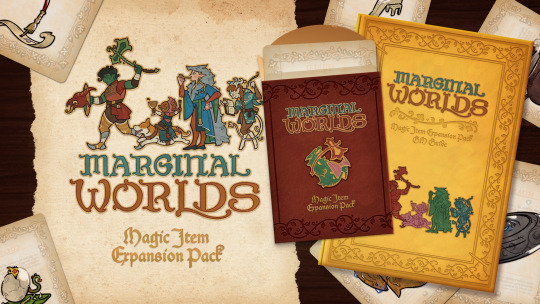
Hey, y'all. We'd like to unveil a project we've been working on in the background for the past year: the Marginal Worlds Magic Item Expansion Pack!
This is kind of a trial balloon -- we'd like to create a whole series of TTRPG materials inspired by medieval literature & history in general, and medieval marginalia in particular. (Hence the "Marginal Worlds" umbrella: we want to help people play in the fantastical worlds suggested by the drawings in the margins of medieval documents... you know what, you get it, moving on.)
The Marginal Worlds Magic Item Expansion Pack is a collection of 50 playable, hand-illustrated magic items and a Game Master’s Guide, pulled straight from the pages of various medieval manuscripts. (And a few based on archaeological finds -- this project leans more towards the literary material though.)
What to Expect:
50 meticulously crafted magic items
Unique and game-changing abilities
Stunning illustrations and lore
Compatible with various tabletop RPG systems
If this seems like your vibe, sign up on Backerkit to be notified when we launch. We're small creators who only got this far with community support, and we're so excited to bring this project to life! Check it out at the link below.
Writing by Mac Boyle (Maniculum Podcast) & Zoe Franznick (Maniculum Podcast, Pentiment). Art by Soojin Paek (Pentiment).
34 notes
·
View notes
Text
Do you think the animals know we love them? The wild birds we leave food for? The raccoons who eat the scraps of apples I throw out into the yard, just for them? The seals we watch on Instagram, whom we name and cheer on as they swim and grow and eat and scavenge? Do you think they know that, across species and world and time, they are loved? Do you think that’s how the angels look at us?
7 notes
·
View notes
Text
Fuck it we ball words of today:
“You’re making the best thing you can make. It’s a devotional practice. The outcome happens regardless.”
- Rick Rubin
2 notes
·
View notes
Text
Should’ve added these in Pentiment, damn.

25K notes
·
View notes
Text
The Seven Social Sins
Founds this scrolling through Instagram and thought these make great villain/character flaws.
Wealth without work
Pleasure without conscience
Knowledge without character
Commerce without morality
Science without humanity
Worship without sacrifice
Politics without principle
14 notes
·
View notes
Text
"Hope is a luxury for those who have a choice."
going absolutely feral over this line in bg3. the vibes?? immaculate. the sheer desperation?? the attitude?? fuck yeah.
What a statement to make.
I always really liked the phrase "we have not the right nor the reason to despair" and the general sentiment that Tolkien wrote about with eucatastrophe, the idea that you can always choose hope, there is always the "turn" in the story where all things turn to good --
but this?
I love the idea that you. Don't. Need. Hope.
That the human condition is so powerful, so withstanding, that a frail human can stand in the face of despair, of hopelessness and heartbreak and ruin and say "I will endure."
Heroes don't need hope. They don't need to "stay positive" or always feel good about the fight they're in. They can acknowledge the despair, the anguish, and choose to keep going.
Sometimes you don't have a choice - you have to endure, hopeless, just a little longer. And sometimes that's victory enough.
87 notes
·
View notes
Text
Now I'm wondering if a vampire could be ordained in bat form. What implications does *that* have?
"menstruation is punishment for original sin" is a fairly common doctrine (altho in my experience it's usually more implicit than just baldly stated like that)
anyway this implies that of all the animal kingdom, humans are not UNIQUE in sinning, but are joined by bats, the elephant shrew, and the spiny mouse species Acomys cahirinus. (according to my 5 seconds on wikipedia at least)
63K notes
·
View notes
Text
Every time I have to deal with a wizard in bg3 I understand a little more why people burned witches.
#they’re so fucking pretentious#don’t burn the nice witch ladies in the woods#go burn the assholes in academia vying for immortality#bg3#baldur's gate 3#gale of waterdeep#i can’t stand him#what an asshole
1 note
·
View note
Text
I teach a lot of undergrads these days. About 3 years ago, I started dedicating a full two hours early every semester to a lecture and discussion about the history of the concept of plagiarism, because I was so annoyed that my students were walking into my classroom with the ironclad belief that they weren't plagiarizing when they were. Sure, the university had some official plagiarism guidelines that they could hypothetically read in a code of conduct somewhere, but they didn't. All they had was a vague memory of some teacher in Grade 8 telling them 'don't copy and paste from wikipedia' and a little learning from experience afterwards.
My hypothesis (which I was delighted to find is shared by Brian Deer, the journalist who broke the Wakefield story and who was the source Illuminaughti plagiarized in the hbomberguy video) is that the rise of automatic plagiarism checkers meant that, in the minds of many students, the formerly more abstract concept of plagiarism ('passing someone else's work off as your own') became a more concrete concept operationalized by the plagiarism checker. Under this concept, a text is plagiarized if (and, implicitly, only if) it is detected as plagiarism by the plagiarism checker. I have spent many hours with students sobbing in my office after I told them that their essays were plagiarized, and they all say that they thought changing the words around was sufficient to make it not plagiarized. Maybe some of them were lying for sympathy, maybe they all were, but I see no reason to not take them at their word. They think that what they're doing is dubious (hence the shame) but they don't think it falls under what they take to be the definition of plagiarism - the thing they can face sanction from the university for. They need to have it pointed out to them that there has been plagiarism for a lot longer than there have been automatic 'plagiarism checkers' and that as their professor, I'm the only plagiarism checker they really need to be concerned about.
It's really easy for me to get frustrated about this. It's frustrating to me that the American public high school system (the source of the majority of my students) has failed to prepare them to think about information, facts, and where they come from. It's frustrating that students can't be arsed to read the university's code of conduct and that the only way I know they have is if I read it straight to their faces. It's very frustrating to see the written scholarly word, a medium to which I have dedicated no small part of my life, treated like it's not worth anything. I'm frustrated to know that most students are not in my class, or in the class of someone else prepared to teach this lesson, so they'll go through their whole lives thinking that an uncited light paraphrase is enough to be worthy of credit. I'm frustrated that people with such a lax attitude towards information are my fellow voters. I once read a real fucking academic essay that was submitted for grades that cited a long quote from Arthur Conan Doyle that, when I traced it, was actually a quote from a fucking TJLC blog. That one isn't frustrating, I guess, that's just funny. It's not all bad.
I'm glad for the hbomberguy video. I hope it will make it easier to convince my students in future. It's too bad he didn't go into the academic context, but it's not like he was short on things to talk about already.
But this is a more general problem than just the video essay context shows. If we're not careful, the very concept of plagiarism can get eroded. I'm not a linguistic prescriptivist, either! If enough people start taking this new concept as plagiarism, that will be what it becomes. I think a world in which that notion of plagiarism is the relevant one would be a worse world. Don't let people erode the idea of credit. You're going to want it later.
26K notes
·
View notes
Text
The Origin Of The Word 'Orc'
The term for a cultural group, as a name, is its demonym. In Cobrin’Seil, demonyms are words from the culture in question. There are some political contentions there – the Eladrin consider themselves more legitimate Elves than Elves, but Elves are called Elves and Eladrin don’t call themselves Elves because they do not want to be considered the same thing as Elves. This is a long standing beef between the kind of people who own libraries older than most countries. But notably, these words are in the languages of the Elf and the Eladrin. Drow is a word from the same language group, a term that the Drow chose for themselves and use for themselves. The Kai of Shadar-Kai are named after their fortress home, which is, again, an Eladrin word, but they’re all from the same cultural group and choose the term.
The term ‘Beast’ in common comes from ‘Beastfolk,’ which is to say a generic term for a scary thing from the forest. But Beasts are named after Beastfolk, and Beastfolk, again, named themselves. The Beastfolk formed a coalition, made a common language, and then shared that language amongst themselves, developing the term bhehst which evolved over time to Beast, and when they needed a term to describe the coalition, Beastfolk was the result.
Common did not impose this name on them, it learned it from them.
Consider the word ‘Goblin’, a word from the Goblins, is notable because the way the word is used and structured, in language, it’s a possessive. Whose land is this? Goblin. Where are we? Goblin. Who are you? Goblin. What are your people? Goblin. This incredibly flexible term, with its overwhelming ubiquity, also plays into the way goblins are perceived as speaking a strange and confusing language. It’s more that they have multi-purpose words are build their language on trust and social intuition. This is why Goblins will often drop a conversation exactly when they know you’re getting frustrated, because they can tell you don’t actually care and need time to process what they said.
In Cobrin’seil, heritage names are largely entirely self-chosen demonyms. Oh sure, there are names for Orcs that Orcs don’t use, but those words are largely considered slurs, or are often inexact – Bugbears, Hobgoblins, Goblins and Orcs were all for a time treated as the same culture and named interchangeably by outsiders who did not interact with them (which means some of these ideas remain codified by the Eresh Protectorate and Dal Raeda histories). A proper cladistic chart can rejoice in how interesting it is that yes, Bugbears and Hobgoblins are extremely closely related, and yet Hobgoblins and Goblins are so distant as to be functionally alien to one another. Humans are closely related to Hobgoblins, but not to Goblins, and Orcs, while closely related to Humans, are extremely different to Hobgoblins, such that they don’t even recognise one another’s common cause.
And if you think Humans are racist against Orcs, you should hear what Hobgoblins think of them sometime.
But what is an Orc? Not culturally – linguistically, what is an Orc?
The simplest answer to that is that the Orc word Orc is a pronoun used by Orcs before contact with other cultures to describe the relationship between clan groups. In technical terms, it’s a first-person – plural – accusative – judicative – epicene- imperative – widely clusive pronoun, which is to say:
It’s a term used used to self-describe (first-person)
It’s a term describing a group (plural, it’s not singular)
It indicates reciept of an object (a grammatical object, like a direct object – think of it as ‘doing’ things)
It asserts a correct identification, that the speaker is sure of the word’s truth (accusative rather than interrogative)
It presents no gender (epicene)
It expresses a command of agency (imperative, much like a sentence that starts with “you”)
It asserts as many people who can be in the group as possible (as ‘Orc’ wants to be maximally inclusive)
This set of layers is not at all atypical, because the huge iceberg of study amongst linguists in Orcs isn’t their vocabulary or writing system. Those are still potentially interesting things to study, but the nature of Orc as a language is that the vocabulary is pretty simplified… if you accept the way that the language is made up of modifiers. See, Orcish language and vocabulary is pretty simple when it comes to nouns and adjectives, and there’s an old aphorism Orcs have a hundred words for war and no word for peace. This is both not true and true, because the place where Orcish language has most of its complexity is not in these nouns but is instead in their incredibly intricate and exhaustive system of pronouns.
Orcish pronouns are varied, elaborate, detailed and tonal. In English, we have a single pronoun for ‘the object right here’ (This) and ‘the object not right here’ (That). You can add plurality to those (these and those), but that’s not a lot of refinement. In Orcish by comparison, the pronouns include sequentiality (the first object we mention, the second object we mention), clusivity (who is included in a grouping), trust (I know this because I witnessed it, because someone told me, because someone I didn’t trust told me, nobody told me), and temporality (when in time this thing I am describing has or will happened or is ongoing).
This means that diagrammatically, an Orcish sentence may be composed of the nouns and verbs ‘took axe hut put skull,’ which we in English might scaffold together as ‘I took my axe from by the hut and put it in that guy’s skull,’ but the same sentence in about the same amount of space in Orcish, communicates ‘I am telling you this because I witnessed and did it and can attest to that, of how I took my father’s hunting axe that I have used to fight with only occasionally and would not be my normal choice for violence, near the hut that I use for occasional trips for fishing and storing things, and for reasons that I think are reasonable but I recognise as regrettable, wound up in a fight with that guy which ended when I used the axe to split his skull.’ And that’s even simplifying it, because there’d be specific interlocking references in the intervening words, and it would cover the same basic space. Orcish pronouns can be synthetic, where two different pronouns may want to apply to a word so they just merge together into another, new, giga pronoun.
This is the big problem of translating Orcish language; the pronouns are so complex and carry so much information that an Orc learning Common has to struggle with trying to wedge that level of sophisticiation in the space we in our language normally use for simple words, like they’re trying to park an apple cart in a desk drawer. Since the language can value precision and specificity and provenance, which we don’t naturally do, they wind up having to give up on trying to convey any of that information with the pronouns. This is why you get the stereotypical ‘thag hit man with axe‘ because from an Orc’s perspective, the pronouns and prepositions we use are so limited, they’re more like mumbling you put between words than an actual system for conveying meaning.
Understand that if there were Orc movies, the fansubbers would have absolutely unsolvable problems ahead of them. They’d encounter a scene where two Orcs saying very blatantly different single words back and forth to one another would, to be linguistically correct, with the time allowed to parse the information, have to subtitle it with just the dialogue:
You.”
“You.”
“You.”
“You.“
“You?”
“You.”
“YOU.
And it would be technically right and incredibly unhelpful. The stereotype of an Orc, inscrutably keyed up just saying ‘YOU.’ at someone is often used to suggest that they’re easily overwhelmed by emotions. That’s not entirely untrue but it’s also that Common is just not fit for purpose to express what Orcs normally can express very freely.
This also results in translation errors of concepts, that result in complicated mistakes about cultural outlook. Take for example the way that Human cultures, speaking in Common, value parenthood to the exclusion of almost all other forms of cultural behaviour. Fatherhood and Motherhood are treated as fundamentally important to even living, when you’re from a Fatherland and you live thanks to the Mother Earth. The fact that Orcs don’t seem to treat either of these ideas with much significance was, for a time, taken as a historical sign of their lack of Human empathy and inability to exist in Human society, with all Orcs coming from parent-less or underparented families, the ‘land of broken homes.’ This is a misunderstanding that comes out of Humans assuming that marriage is normal.
Typically though, Orcs don’t have children. A bit under half the population have children and a bit more than half of the population don’t. It’s not because of a problem or anything. There’s no strong incentive to do so, no implication that you won’t. Orcs typically remain able bodied up to their end of life, and the narrative in a capitalist society of producing children to care for you and keep you company as you get older is already met by the way that Orcish communities are already built on a steady platform of community connection.
Orc society isn’t a typical patriarchal or matriarchal setup but more avuncular. Most Orcs care, a little, for the kids in their community; parents are often considered exhausted by having the kids, and therefore, the community members around them take care of the kid and help raise them. The myth that Orcs ‘mature faster’ is just that any given 14 year old Orc has already been trained, by their community, to do a lot of utilitarian things like making their own food and lodgings and travelling, because that’s just more of what’s in the culture. It’s not that there’s no room for things like birdwatching and painting and creating art objects, it’s just that the foundations aren’t reliant on things like reading and writing and focus more on practical skills.
The other thing is that Orc populations often have very lopsided and punctuated population growths; if a band raids an area and brings back with everything the other area had that they now have to care for, the situation can be where the Orcs now have a generation worth of new kids, so there’s no specific reason for them to have more kids of their own through the untidy process of reproduction. There’s no obvious problem here, because again: there’s no assumption of partnership or children as a natural result, so these kids are usually adopted and raised by the Orcs themselves, and again, this is seen as pretty reasonable, even forming out of parenting units that don’t necessarily think of one another as friends or seem compatible the way that Humans would present them. No fixed opposite gender pairings or even fixed sizes of groups, because again: Marriage is not normal.
Humans understand marriage to be a legal codification of a culturally acceptable monogamous structure where two people choose to cohabitate, pool resources, and that this is a perpetual state. It’s usually of opposite genders but not always and it’s usually inclusive of having children, but not always. Depending on where in the world you do it, Humans kids being from married families is seen as a sign the kid has more stability and is less likely to be antisocial or criminal.
Orcs on the other hand, have no such common social arrangement, with the closest they have being a thing that some researchers refer to as a ‘child loan.’ Some Orcs decide they want some kids, so they ask their own support network if they can be, for a period — usually seven years — excluded from typical community obligations for providing. It’s a commitment to create a space for the kid to grow up in, and usually only asked for a first child or an adoption of a few. After the duration of time, the deal is over – the ‘parents’ in the child loan don’t even necessarily assume they’ll be together at that point and the community obligations return. There’s no interest on this, per se, but it’s often framed as a ‘loan’ in language because a lot of Orc language is debt-biased.
Basically, there’s a period where any time you’re given the choice between staying out to gather more resources than you need or chop more wood than you can to benefit communal stockpiles, Orcs believe, if you’re under this deal, you should absolutely the hell not be chopping wood or fishing, you should be back home, enriching the life of your child and supporting your partners in the situation.
This is how Orcs get that common base of knowledge. It’s true that Orcs aren’t fantastically literate, but the lack of written language doesn’t relate to their sophisticated language system. Right now, the Orcish language gets written in a form of Urd script, a little stamp of colonisation from Ogres in the past that the Orcs largely escaped. The lack of infrastructural information is secondary because the culture tends towards being built out of people with direct experience in a lot of different hands-on skills. You don’t need to read manuals if you can rely on finding someone in your society who can help teach you things. This means there’s a lot of focus on less the importance of blood or descent and a lot more about continued maintenance of cultural identities. Basically, nobody likes seeing someone in the community die without an apprentice or a follower to carry on what they knew.
This is also where the stereotypes of Orcs coming from ‘broken homes’ because a lot of Orcs’ parents, after the kid is roughly at a point where they can start contributing to the home, discuss if they want the current arrangement to be ongoing, and decide to change it, meaning less time with one parent or the other. The kid then usually spends their time hanging around an ‘uncle’ in the community with the specialisation they’re interested in.
Now understand that from an Orc’s perspective, this is a pretty reasonable thing. Orcs are very used to the idea of impermanent things, life and property and so on. The Human sees a horrifying constant attempt to emulate Human marriage which always ends in failure and raises a child who is, well, an Orc, and is seen as fulfilling a cycle of violence. The Orc sees Human marriage and asks ‘why do you send a letter to the government to tell them who you’re having sex with? that’s bloody weird.’
Ironically, though, Orcs are also associated with letters for another reason. See, a lot of city folk’s stereotype, to the point where in plays and theatre, it’s one of the most common roles available to Orcs, is the idea of an Orc courier. The idea kicked off from a historical position where, out in the battlefield, Eresh nobles would pay Orcs from nearby to deliver messages, because they were wholly independent, incredibly reliable, and unlikely to break promises. This was such standard practice that Orcish communities would often check out battlefields and wars like it was a corner for work.
But this became enough of a thing at battlefields, that there were established relationships, that when knights and commanders headed back to the cities, Orcs would commonly come along, and do long-distance courier work from city to city. If Orcs were travelling the highways with messages on their own, like a mail service, often nobles would give the general some other notes, and thus began the pattern of a small number of Orcs having this job. That led to more coming along to do it, because it’s work they find easy (long distance travel under no pressure in return for convenient rewards at both ends of the travel).
This was long running enough that nobles started to hire them specifically, Orcs formed loose unions, recruited non-Orcs that could do the job, and language about the stereotype kicked in. It’s a really persistent rumour that Orcs are couriers because they can’t read, so the message is secure. This is a really stupid stereotype, because the messages inevitably have their destination written on them and the Orcs have to be able to read that.
The upshot is that ‘Orc messenger’ is just a weird stereotype that the people of the Eresh Protectorate particularly hold to, because it’s one of the ways that Orcs show up in the cities most commonly… even if that archetype is so old that the Orc couriers founded Orc Courier companies, that are now just Courier companies and the city-living Orcs of the Eresh Protectorate do whole hosts of jobs. It’s also even stranger that some people maintain the stereotype of an Orc as what we’d recognise as a Pony Express style courier, a lone wanderer on a horse with no roots and no friends, romanticised as an image under the starry sky, and as a terrifying highway plunderer.
These two things seemingly exist completely independently in the head of idiots.
This originally started as a series of unstructured chosts over on Cohost, where I talked – without much formal structure – about the Orcs of Cobrin’Seil. This post is here because it’s more searchable and more readable for things like oh, my D&D players. But if you want to see this kind of thing in its draft form, you should check out Cohost. It’s a cool website that lets me draft larger things like this without the same churn as you see on sites like Tumblr.
I like Cohost! I like writing about things like this! I like being able to hand you nearing on three thousand words of Orc lore, derived in pieces from drip-fed ideas about linguistic demonym structure and make a whole ding dang piece about it! And over on Cohost, you can comment on it and encourage me! I like that too! Some of the ideas here were definitely filtered throug people commenting on my Orc cultures!
Check it out on PRESS.exe to see it with images and links!
109 notes
·
View notes
